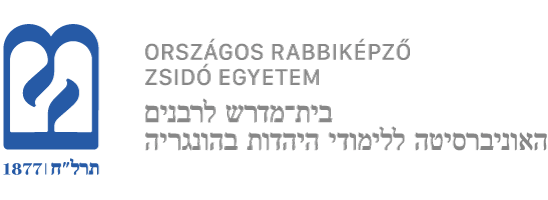Obtaining the doctoral degree
General provisions
Conditions of obtaining the degree in Jewish Religious Studies (לימודי יהדות) the eight-semester-program:
- passing the comprehensive examination,
- documenting independent achievements in research,
- completing the course requirements (240 credits), and receiving the absolutorium (university leaving certificate),
- fulfilling the language requirements,
- submitting the dissertation,
- and defending it in public disputation.
The Doctoral Student in the eight-semester program applies for the comprehensive examination after obtaining the prescribed 120 credits and fulfilling the language requirements. The second phase (that of dissertation and research) of the eight-semester program and the Doctoral Procedure starts with passing the comprehensive examination.
Doctoral Students in the eight-semester program need not apply for the Doctoral Procedure since it starts automatically with passing the comprehensive examination and the registration for the next semester.
The Doctoral Candidate status
The Doctoral Dissertation must be submitted within three years from the date of the comprehensive examination.
The Rector may extend the program deadlines at most by twelve months if cogent grounds are submitted at the proper time. In the research and dissertation phase, the total combined duration of the period over which students may interrupt their studies may not exceed two semesters.
In lack of other regulations, the rights and liabilities of students shall apply to the Doctoral Candidates.
The Doctoral Candidate status shall cease if the doctoral degree is awarded to the candidate by the Doctoral Council, or if the candidate did not submit his/her doctoral thesis within two years after establishing the Doctoral Candidate status.
Comprehensive examination
The comprehensive examination is a thorough and comprehensive form of assessment for the evaluation of the Doctoral Candidate’s knowledge acquired in the relevant discipline during the course of eight semesters.
The Comprehensive Examination Board consists of university lecturers or researchers holding an academic degree: CSc, PhD, or DLA, where appropriate.
The comprehensive examination consists of two parts, which are arranged in the following order:
- the theoretical part which aims to measure the preparedness of the candidate’s theoretical knowledge. The candidate is required to take an examination in at least two subjects or topics. The subjects or topics are listed in the Program of the Doctoral School. The theoretical examination may also have a written part,
- the dissertation part in which the Doctoral Candidate must present the progress made in the topic of the dissertation and his/her research plan for the second period, including a schedule for the publication of his/her research findings.
The comprehensive examination must be taken on completion of the taught courses and research period, at the end of the fourth semester.
The comprehensive examination shall be taken in front of the Comprehensive Examination Board, which shall consist of at least three Members. The Doctoral Candidate’s Supervisor shall not be part of the board, but he/she shall be invited to the examination.
The Comprehensive Examination Board consists of at least three voting Members:
- the Chair who shall be a university professor, habilitated associate professor, habilitated associate, a lecturer or researcher holding the title of Doctor of the Hungarian Academy of Sciences, or a professor emeritus (the Chair can have a contractual relationship with the University),
- at least two other Members holding an academic degree, at least one of whom shall not have a contractual relationship with the university,
- the Minutes Secretary who shall be a lecturer, researcher or a Doctoral Student having a contractual relationship with the university, and is an expert in the given field, but shall not have a right to vote.
The Supervisor shall be provided with the opportunity to evaluate the Doctoral Candidate’s work and preparedness in writing prior to the examination, or orally at the examination.
Minutes are kept at the comprehensive examination containing a written evaluation. The Comprehensive Examination Board evaluates the theoretical and the dissertation part of the examination separately.
The comprehensive examination shall be judged on two level-scale: satisfactory, not satisfactory.
The comprehensive examination is deemed successful if more than half of the Members of the Comprehensive Examination Board evaluate both parts of the examination as satisfactory.
The unsuccessful comprehensive examination may only be repeated once during the given examination period.

